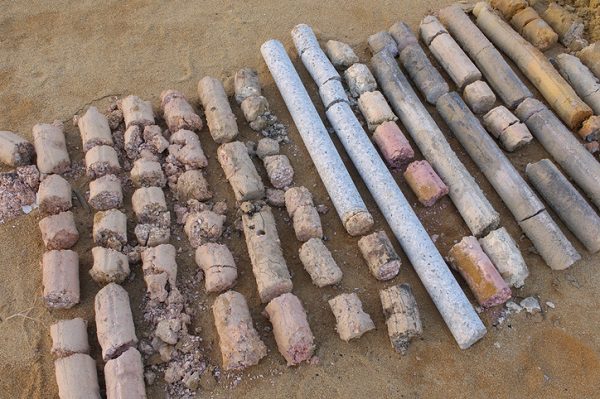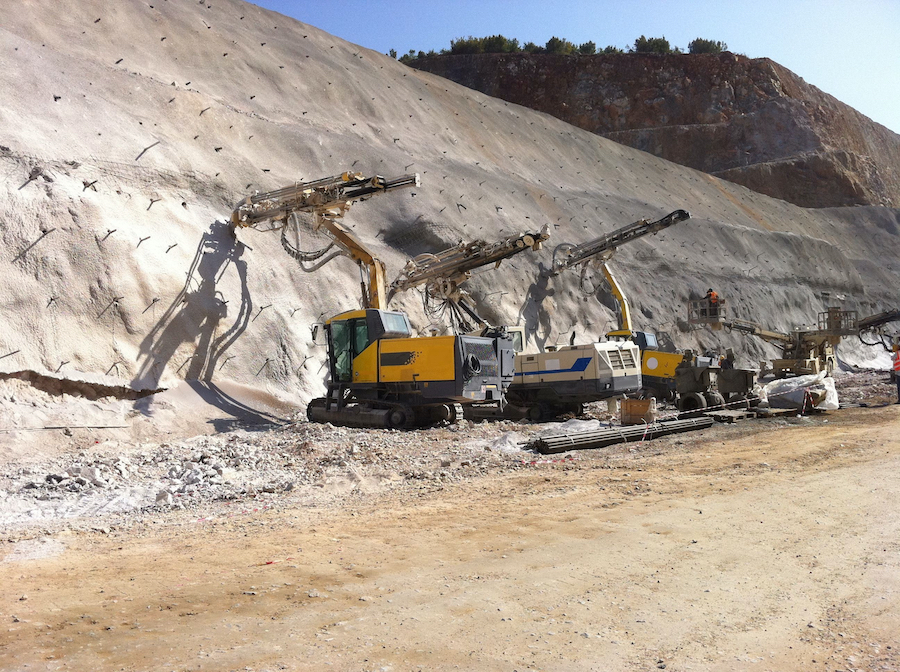Finding the most effective Geotechnical Companies in South Africa: Key Considerations
Finding the most effective Geotechnical Companies in South Africa: Key Considerations
Blog Article
The Importance of Geotechnical Engineering in Resolving Ecological Obstacles and Enhancing Building Security
Geotechnical design serves as a keystone in the crossway of ecological stewardship and building safety and security, giving critical insights into the habits of soil and rock under different conditions. By implementing critical website investigations and tailored reduction actions, geotechnical engineers play a crucial duty in guarding both human lives and ecological honesty.

Role of Geotechnical Engineering
Geotechnical design plays an important function in the style and construction of facilities by resolving the actions of soil and rock materials under different conditions. This area of engineering is crucial for comprehending the communication in between structures and the ground, which consists of figuring out the load-bearing ability of dirt, examining stability, and forecasting prospective negotiation or failing.
Geotechnical engineers are in charge of performing site investigations, which include sampling and testing dirt and rock to collect data on their physical and chemical properties. This details is essential for designing structures, preserving walls, and other earth-retaining frameworks that ensure safety and security and durability. In addition, geotechnical engineering informs the option of proper building and construction techniques and products, thus reducing threats connected with soil actions.
Additionally, the integration of geotechnical design concepts into city preparation and ecological monitoring is important for dealing with obstacles such as ground contamination and groundwater administration. By understanding geotechnical variables, engineers can create lasting remedies that improve the durability of facilities versus natural threats, while likewise advertising environmental stewardship. Ultimately, the role of geotechnical engineering is essential for accomplishing secure, resilient, and environmentally mindful construction methods.
Soil Disintegration Mitigation
Soil erosion poses a substantial hazard to both ecological security and framework stability, affecting approximately 24 billion bunches of abundant dirt shed yearly worldwide. This phenomenon is aggravated by aspects such as logging, urbanization, and inadequate farming methods. Geotechnical design plays a critical duty in creating effective soil erosion mitigation approaches that safeguard both the setting and building and construction jobs.
One approach involves the implementation of disintegration control methods such as vegetation planting, which maintains soil via origin systems. Furthermore, the construction of preserving wall surfaces and balconies can effectively reduce surface runoff and secure prone areas from erosion. Appropriate drain layout is additionally important; it lessens water buildup and routes excess runoff far from essential structures.
Additionally, geotechnical designers use dirt stablizing strategies, such as the application of geotextiles and naturally degradable mats, to improve soil cohesion and protect against destruction - geotechnical companies in south africa. Normal surveillance and analysis of erosion-prone websites make it possible for timely interventions, guaranteeing long-lasting sustainability. By incorporating these strategies, geotechnical engineering not just mitigates the influences of soil disintegration but additionally adds to the strength of infrastructure versus environmental challenges, eventually promoting a safer and more sustainable developed atmosphere
Groundwater Protection Approaches
Groundwater serves as an essential source for alcohol consumption water, farming, and industrial processes, making its defense important for ecological sustainability and public health and wellness. Reliable groundwater protection approaches are essential in alleviating contamination dangers and making certain the long life of this resource.

Regular monitoring of groundwater top quality is also important, making it possible for early discovery of contamination resources and assisting in prompt removal initiatives. Using innovative innovations, such as geophysical surveys and remote sensing, help in recognizing possible threats to groundwater reserves.
In addition, public education and stakeholder interaction are important, promoting neighborhood support for groundwater defense initiatives. geotechnical specialist. By combining regulative procedures, technological Continue advancements, and community participation, we can develop a comprehensive framework that safeguards groundwater resources while promoting lasting growth and construction techniques
Landslide Threat Monitoring
Landslides present considerable dangers to both human safety and security and framework, making effective threat administration methods essential. Geotechnical design plays a critical function in identifying, evaluating, and mitigating landslide threats. A thorough understanding of slope stability, soil technicians, and hydrology is vital for creating effective threat monitoring plans.
The initial action in landslide threat administration involves extensive website examinations, that include geological mapping and soil testing. These investigations assist designers assess the potential for landslides by recognizing essential factors such as slope angles, dirt make-up, and water content. Utilizing advanced innovations such as remote sensing and geophysical surveys can improve the accuracy of these evaluations.
As soon as dangers are determined, ideal mitigation actions can be carried out. These may consist of design options such as keeping wall surfaces, drainage systems, and incline stablizing techniques. Checking systems should be developed to find signs of ground movement and adjustments in water degrees, permitting for proactive interventions.

Enhancing Building And Construction Safety
Construction sites usually present a myriad of hazards that can jeopardize employee safety and task integrity. Geotechnical design plays an essential function in boosting construction safety and security by giving necessary understandings into subsurface problems. With comprehensive dirt and rock evaluation, geotechnical engineers can identify prospective threats, such as dirt instability, groundwater issues, and seismic susceptabilities, which might endanger the security of construction tasks.
Implementing geotechnical options, such as appropriate structure style and making use of keeping structures, reduces these risks considerably. These services not just make sure the stability of the structures being constructed yet likewise produce a safer working setting for building and construction employees. In addition, extensive tracking and analysis of site problems throughout the building procedure are crucial. Utilizing sophisticated technologies like ground-penetrating radar and inclinometer systems makes it possible for real-time information collection, enabling for timely interventions when hazards are detected.
In addition, promoting a society of safety and security with training and adherence to established safety protocols additionally improves building and construction site safety. By integrating geotechnical experience right into the preparation and look here implementation phases, building tasks can accomplish higher safety and security criteria, inevitably safeguarding employees and making sure effective job conclusion.
Final Thought
In verdict, geotechnical engineering works as an important technique in promoting and taking on ecological difficulties construction safety and security. With reliable dirt disintegration mitigation, groundwater defense techniques, and landslide threat monitoring, geotechnical engineers contribute to the growth of durable infrastructure. The assimilation of these techniques promotes a safer building environment and enhances the sustainability of civil design jobs. Eventually, the knowledge of geotechnical engineers is indispensable in guarding both natural deposits and human lives against potential hazards.
Geotechnical engineering serves as a keystone in the crossway of ecological stewardship and construction security, providing crucial insights right into the habits of soil and rock under various problems. Geotechnical design informs the selection of suitable building and construction techniques and materials, thereby reducing risks associated with soil behavior.
Geotechnical design plays a crucial role in developing effective dirt erosion mitigation approaches that guard both the setting and building and construction jobs.
In addition, geotechnical engineers employ dirt stablizing methods, such as the Recommended Site application of geotextiles and eco-friendly floor coverings, to enhance dirt cohesion and prevent destruction. With thorough soil and rock analysis, geotechnical engineers can recognize prospective threats, such as dirt instability, groundwater problems, and seismic susceptabilities, which may endanger the security of building tasks.
Report this page